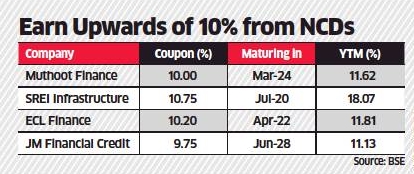
Investors with a risk appetite could consider investing in some of the non-convertible debentures available in the secondary market, as these could give a return of as much as 10-15%, say wealth managers.
Uncertainty in the non-banking financial segment following the recent developments at the IL&FS Group, Essel Group, Dewan Housing Finance and the Reliance Group of Anil Ambani, has led to lower appetite for NBFC paper among investors. With low demand, yields on their instruments have shot up.
Yields on AA-rated NCDs, such as from SREI Infrastructure Finance, have shot up to 12-21%. NCDs of Indiabulls Commercial Credit yield 13%, while those of ECL Finance yield 12% and JM Financial Credit Solutions 11-14%. The yield on India Infoline Finance’s paper is 12% and Muthoot Finance’s is 10-12%.
These yields are attractive to investors given that bank deposits are offering just 6.5-8% a year.
Investors can consider investing a part of their investment into some of these after doing proper due diligence, thereby freezing stable high returns for a long period on company risk that they have chosen to take. Debt fund investors, who are shaken by poor returns from debt funds due to defaults, downgrades or yield moves, can also consider this option.
Wealth managers also cautioned about the risk of buying these securities from the secondary market. In the current environment, the liquidity tap for NBFCs is closing with investors staying away from them. HNIs and investors who understand bond markets and the risk associated with it, could buy some NCDs from the secondary market. NCDs of Edelweiss and JM Financial Credit Solutions are recommended to such investors.
However, for retirees and risk-averse investors who depend on interest income for their expenses, they should stick to AAA-rated companies that are backed by strong managements. NCDs of AAA-rated companies, like Tata Capital, L&T Finance and Mahindra Finance, offer lower yields of 7.5-9% per annum.
According to some wealth managers, liquidity in these NCDs was low and could quickly dry up in case of any adverse event and hence investors must assess their risk appetite and invest only a small amount.
Investors must buy with the objective of holding them till maturity.


